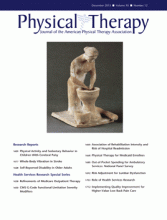Abstract
Background A Medicare beneficiary's annual outpatient therapy expenditures that exceed congressionally established caps are subject to extra documentation and review requirements. In 2011, these caps were $1,870 for physical therapy and speech-language pathology combined and $1,870 for occupational therapy separately.
Objective This article considers the distributional effects of replacing current cap policy with equal caps by therapy discipline (physical therapy, occupational therapy, and speech-language pathology) or a single combined cap, and risk adjusting the physical therapy cap using beneficiary characteristics and functional status.
Methods Alternative therapy cap policies are simulated with 100% Medicare claims for 2011 therapy users (N=4.9 million). A risk-adjusted cap for annual physical therapy expenditures is calculated from a quantile regression estimated on a sample of physical therapy users with diagnoses and clinician assessments of functional ability merged to their claims (n=4,210).
Results Equal discipline-specific caps of $1,710 each for physical therapy, occupational therapy, and speech-language pathology result in the same aggregate Medicare expenditures above the caps as 2011 cap policy. A single combined-disciplines cap of $2,485 also results in the same aggregate expenditures above the cap. Risk adjustment varies the physical therapy cap by as much as 5 to 1 across beneficiaries and equalizes the probability of exceeding the physical therapy cap across diagnosis and functional status groups.
Limitations One limitation of the study was the assumption of no behavioral response on the part of beneficiaries or providers to a change in cap policy. Additionally, analysis of risk adjusting the therapy caps was limited by sample size.
Conclusions Equal discipline-specific caps for physical therapy, occupational therapy, and speech-language pathology are more equitable to high users of both physical therapy and speech-language pathology than current cap policy. Separating the physical therapy and speech-language pathology caps is a change that policy makers could consider. Risk adjustment of the therapy caps is a first step in incorporating beneficiary need for services into Medicare outpatient therapy payment policy.
Footnotes
Dr Amico, Mr Pope, Dr Meadow, and Dr West provided concept/idea/research design. Dr Amico, Mr Pope, Dr. Pardasaney, Mr Silver, Dr Meadow, and Dr West provided writing. Mr Silver provided data collection. Dr Amico, Mr Pope, Dr Pardasaney, and Mr Silver provided data analysis. Dr Amico, Mr Silver, Dr Dever, and Dr Meadow provided project management. Dr Meadow and Dr West provided institutional liaisons. Dr Pardasaney, Dr Dever, Dr Meadow, and Dr West provided consultation (including review of manuscript before submission). The authors thank Anne Deutsch, Barbara Gage, Melvin Ingber, Alan Jette, Walter Adamache, Janet Valluzzi, and Alex Laberge for their contributions to this work. Any interpretations, opinions, or errors are the responsibility of the authors and not those we acknowledge.
The Centers for Medicare & Medicaid Services (CMS) funded this research. Any interpretations, opinions, or errors are the responsibility of the authors and not those of the CMS.
- Received September 24, 2014.
- Accepted June 8, 2015.












